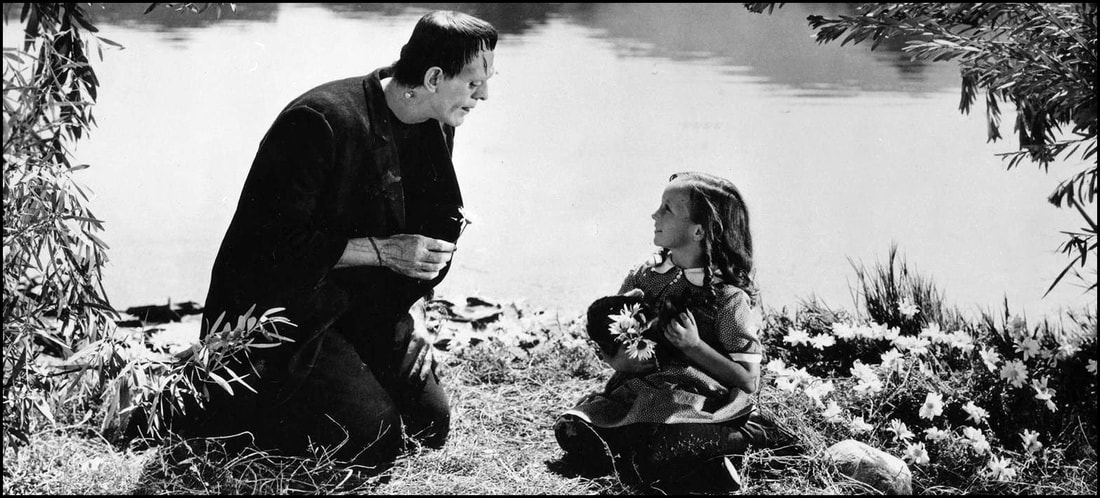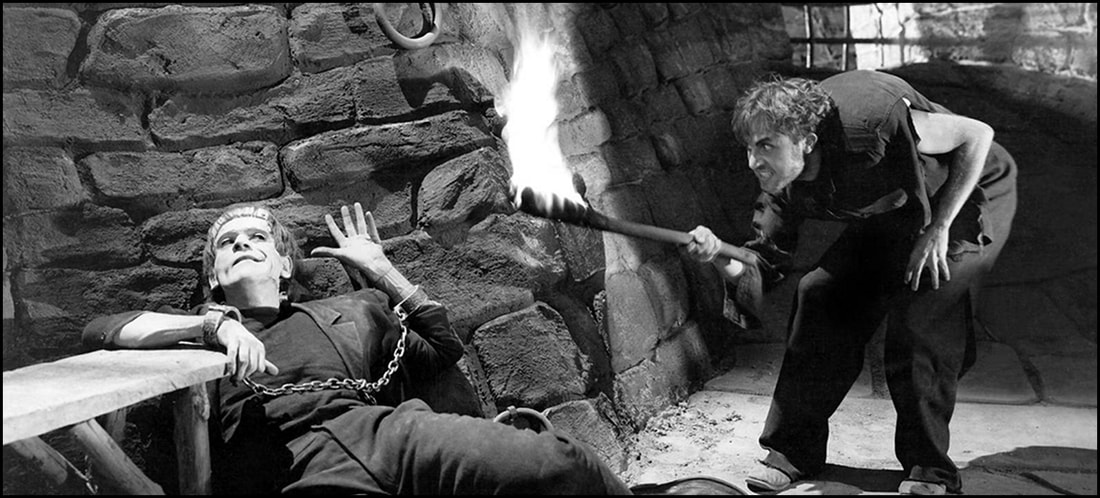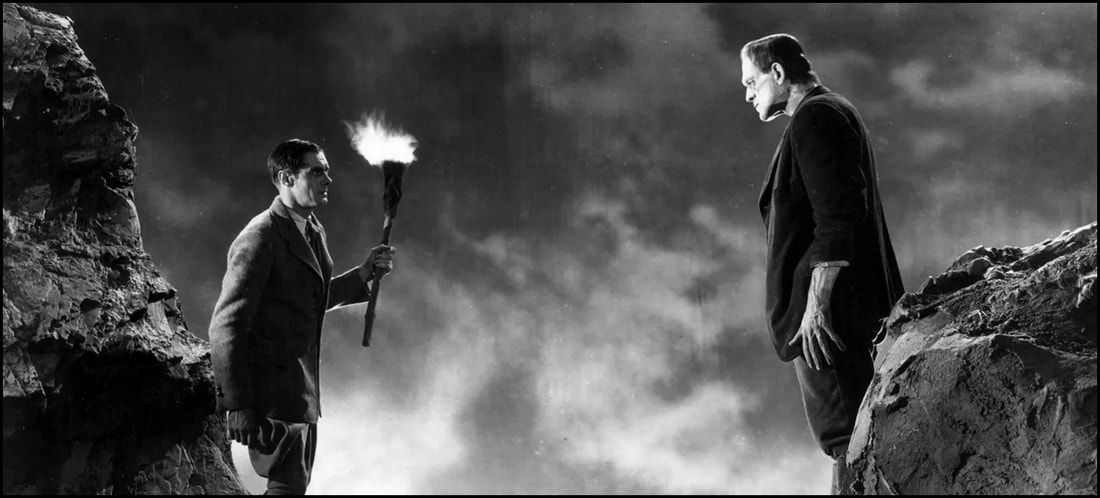Sigh.
It’s a difficult prospect. I can’t even begin to imagine when I first saw the picture or just how old I might’ve been. In my youth, I scoured the weekly (freebie) TV broadcast schedule that came printed with our local newspaper so that way I’d know reasonably in advance when any Science Fiction, Fantasy, and/or Horror films were airing. Given that this was well before the advent of home video recorders, I’d even circle an upcoming movie (in pen, no less), and I’d check and recheck the guide regularly. Also, as these movies were edited for television, I wasn’t even aware that I’d never even seen Frankenstein in its entirety. Years later, I remember watching it on VHS and realizing that the film had so many smaller bits and pieces I’d never seen, and this is why I’m forever grateful that film companies and distributors have gone to great pains to re-release these classic movies with so many wonderful special features. Fans like me can never get enough of that extra content, and I’ll go to my grave forever jealous of just how lucky you young Turks these days are but don’t know it.
In any event …
Having something to say about Frankenstein isn’t even a subject I approach easily. It’s the kind of project that has been written about since its inception and up through today. As an intellectual property, Frankenstein continues to both move and shake storytellers who either wish to re-interpret for the modern age or entirely re-invent it with their own narrative spin. While there are there are countless imitators, there’s really only one true original, so bear with me as I organize my thoughts around one of the seminal viewing experiences of my youth. I’ll try to tell you why a picture nearly one hundred years old today still deserves your undivided attention.
(NOTE: The following review will contain minor spoilers necessary solely for the discussion of plot and/or characters. If you’re the type of reader who prefers a review entirely spoiler-free, then I’d encourage you to skip down to the last few paragraphs for the final assessment. If, however, you’re accepting of a few modest hints at ‘things to come,’ then read on …)
From the film’s IMDB.com page citation:
“Dr. Frankenstein dares to tamper with life and death by creating a human monster out of lifeless body parts.”
Still, a film is only as good an experience as are the – snicker snicker – sum of its own parts; and – in that respect – I think Frankenstein still rises to the occasion.
From what I’ve come to know, its screenplay – chiefly attributed to Peggy Webling, Garrett Fort, and Francis Edward Faragoh – is actually an adaptation that combines characters, elements, and circumstances from multiple stage play incarnations all stemming from the original Shelley novel. (While I’ll admit that I’ve not yet read the book, I’ve been told that the story is vastly different from many of the theatrical interpretations.) As a story, it certainly gives each of the main players – Henry Frankenstein, Elizabeth, Victor Moritz, and The Monster – their respective set of characteristics and motivations; and it rather deftly pits them all against one another in big ways and small from start-to-finish. Curiously, Baron Frankenstein (as played by Frederick Kerr) enjoys a good amount of screen time, is a likeable enough blowhard, and makes the most of his scenes only then to completely disappear from the film during its second half. (Yes, yes, yes: he does show up briefly in the very last scene of the picture, but one would think he would’ve been shown either during the pre-wedding sequences or the town’s call-to-action once the threat of The Monster is very real.) So – while not perfect – it’s a fabulously lean-and-mean 70-minute adventure that delivers on its every promise.
Director James Whale – who originally passed on the project for reasons I’ve not satisfactorily verified – does a masterful job staging the bulk of the monstrous affair. He rather deftly keeps the picture unfolding on a fairly even keel, giving balanced amounts of division between spectacle and subtlety. In fact, he stages a few scenes artistically so that the camera can pan through multiple rooms on a single pass, following the characters as they both move through the action as either tension mounts or development necessitate. He definitely tackled several scenes with specific goals in mind, be it mesmerizing audiences with the fantastic spread of Frankenstein’s laboratory set (the rise of the gurney through the ceiling skylight) or The Monster’s very first full body reveal (having him back through the door and turn). I think he proved without question that he approached the subject matter with the proper measure of seriousness but wasn’t above throwing in something light (for visual comedy) in the right context.
As for the players?
Colin Clive plays Henry Frankenstein – not ‘Victor Frankenstein,’ as many other incarnations have written – and clearly his best moments are in the first half of the picture. In the guise of the man who would eventually come to know how God felt (in creating life), he gives a pretty commanding performance. Once he’s accomplished the unimaginable, the script even gives the actor a scene where he can kinda/sorta wax on the mindset necessary to achieve great results – the daring, the boldness – and in Clive’s hands it feels as if he’s both pleased if not a bit shocked with what he’s done. Since he spends the latter half of the picture chasing down his creation only to find himself being pummeled by it, there just isn’t as much substance in it for the actor to do much other than go with the flow.
Saving the best for last, genre legend Boris Karloff is truly the steward who made so very much of this work. Without his talents being fully centered under the makeup and in the limelight here, I’m not so sure that Frankenstein – as a picture – would’ve endured as long as it has. Some moments, there’s a vacancy behind his eyes – when the creature has yet to form his thoughts clearly and is merely responding to commands like a trained pet – and others are lit up with an animal frenzy. While the script kinda/sorta stacks the deck against him (the whole idea of the abnormal brain is not something part and parcel of the original novel), Karloff perseveres through the good, the bad, and the ugly, always staying true to the demands of the scene. Audiences might’ve felt sorry for him – up to a point – and that’s owed to the man’s abilities to convey a limited set of emotions while all the while looking like something spawned by the dark arts.
Frankenstein (1931) was produced by Universal Pictures. DVD distribution (for this particular release) is being coordinated by Universal Studios. I viewed the film as part of their Frankenstein: Complete Legacy Collection released in 2016.
Highest recommendation possible.
While I’d stop short of calling Frankenstein the perfect film, I’d still happily call it a pretty damn near perfect viewing experience. Though its run time is a bit short, I think the film still moves at a appreciable pace, one that gives the principle players just enough time to hit their marks and maybe even spend a few wonderful moments talking about life as they know it against the backdrop of evolving Horror. Of course, the real magic starts when The Monster arrives, and anyone who considers himself (or herself) a fan of Science Fiction, Fantasy, and/or Horror deserves to experience the feature uncut as Universal Pictures (and God himself, maybe) intended.
-- EZ




 RSS Feed
RSS Feed